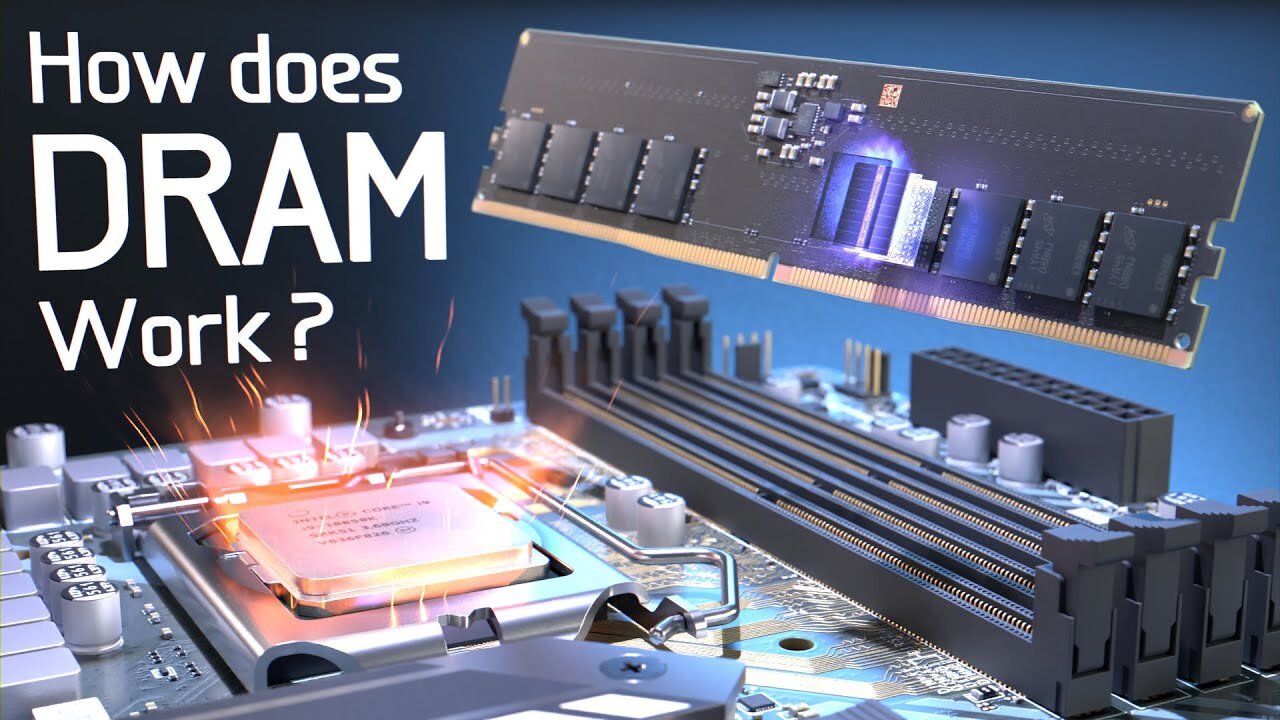Premium Only Content

How does Computer Memory Work?
Although memory is technically any form of electronic storage, it is used most often to identify fast, temporary forms of storage. If your computer's CPU had to constantly access the hard drive to retrieve every piece of data it needs, it would operate very slowly. When the information is kept in memory, the CPU can access it much more quickly. Most forms of memory are intended to store data temporarily.
The CPU accesses memory according to a distinct hierarchy. Whether it comes from permanent storage (the hard drive) or input (the keyboard), most data goes in random access memory (RAM) first. The CPU then stores pieces of data it will need to access, often in a cache, and maintains certain special instructions in the register. We'll talk about cache and registers later.
All of the components in your computer, such as the CPU, the hard drive and the operating system, work together as a team, and memory is one of the most essential parts of this team. From the moment you turn your computer on until the time you shut it down, your CPU is constantly using memory. Let's take a look at a typical scenario:
You turn the computer on.
The computer loads data from read-only memory (ROM) and performs a power-on self-test (POST) to make sure all the major components are functioning properly. As part of this test, the memory controller checks all of the memory addresses with a quick read/write operation to ensure that there are no errors in the memory chips. Read/write means that data is written to a bit and then read from that bit.
The computer loads the basic input/output system (BIOS) from ROM. The BIOS provides the most basic information about storage devices, boot sequence, security, Plug and Play (auto device recognition) capability and a few other items.
The computer loads the operating system (OS) from the hard drive into the system's RAM. Generally, the critical parts of the operating system are maintained in RAM as long as the computer is on. This allows the CPU to have immediate access to the operating system, which enhances the performance and functionality of the overall system.
When you open an application, it is loaded into RAM. To conserve RAM usage, many applications load only the essential parts of the program initially and then load other pieces as needed.
After an application is loaded, any files that are opened for use in that application are loaded into RAM.
When you save a file and close the application, the file is written to the specified storage device, and then it and the application are purged from RAM.
In the list above, every time something is loaded or opened, it is placed into RAM. This simply means that it has been put in the computer's temporary storage area so that the CPU can access that information more easily. The CPU requests the data it needs from RAM, processes it and writes new data back to RAM in a continuous cycle. In most computers, this shuffling of data between the CPU and RAM happens millions of times every second. When an application is closed, it and any accompanying files are usually purged (deleted) from RAM to make room for new data. If the changed files are not saved to a permanent storage device before being purged, they are lost.
One common question about desktop computers that comes up all the time is, "Why does a computer need so many memory systems?"
-
 LIVE
LIVE
The Jimmy Dore Show
2 hours agoCanadian PM Justin Trudeau To Resign! Elon Pushes Social Credit Scores! w/ Whitney Webb
12,572 watching -
 LIVE
LIVE
The StoneZONE with Roger Stone
43 minutes agoJustin Trudeau Throws In The Towel! w/ Canadian Hockey Legend Theo Fluery | The StoneZONE
897 watching -
 UPCOMING
UPCOMING
We Like Shooting
10 hours agoDouble Tap 391(Gun Podcast)
193 -
 2:32:43
2:32:43
FreshandFit
10 hours agoAndrew Wilson VS Gary The Numbers Guy Astrology & Numerology Debate!
52.1K36 -
 LIVE
LIVE
Dr Disrespect
9 hours ago🔴LIVE - DR DISRESPECT - TRIPLE THREAT CHALLENGE - RIVALS, PUBG, WARZONE
2,629 watching -
 1:15:03
1:15:03
Dad Dojo Podcast
7 hours agoEP16: Parenting: Then vs Now
2.32K -
 53:58
53:58
Sarah Westall
1 hour agoBlack Pilled vs Learning Reality and Maintaining Perspective, AI Reality w/ Johnny Vedmore
7.35K -
 55:01
55:01
LFA TV
1 day agoJan. 6, 2021, vs. Jan. 6, 2025 | TRUMPET DAILY 1.6.25 7pm
6.71K -
 1:19:27
1:19:27
The Big Mig™
23 hours agoLimitless Health with Calley Means
3.28K7 -
 1:37:26
1:37:26
Redacted News
5 hours agoBREAKING! Trump Effect is Real Justin Trudeau Resigns in Disgrace
132K182